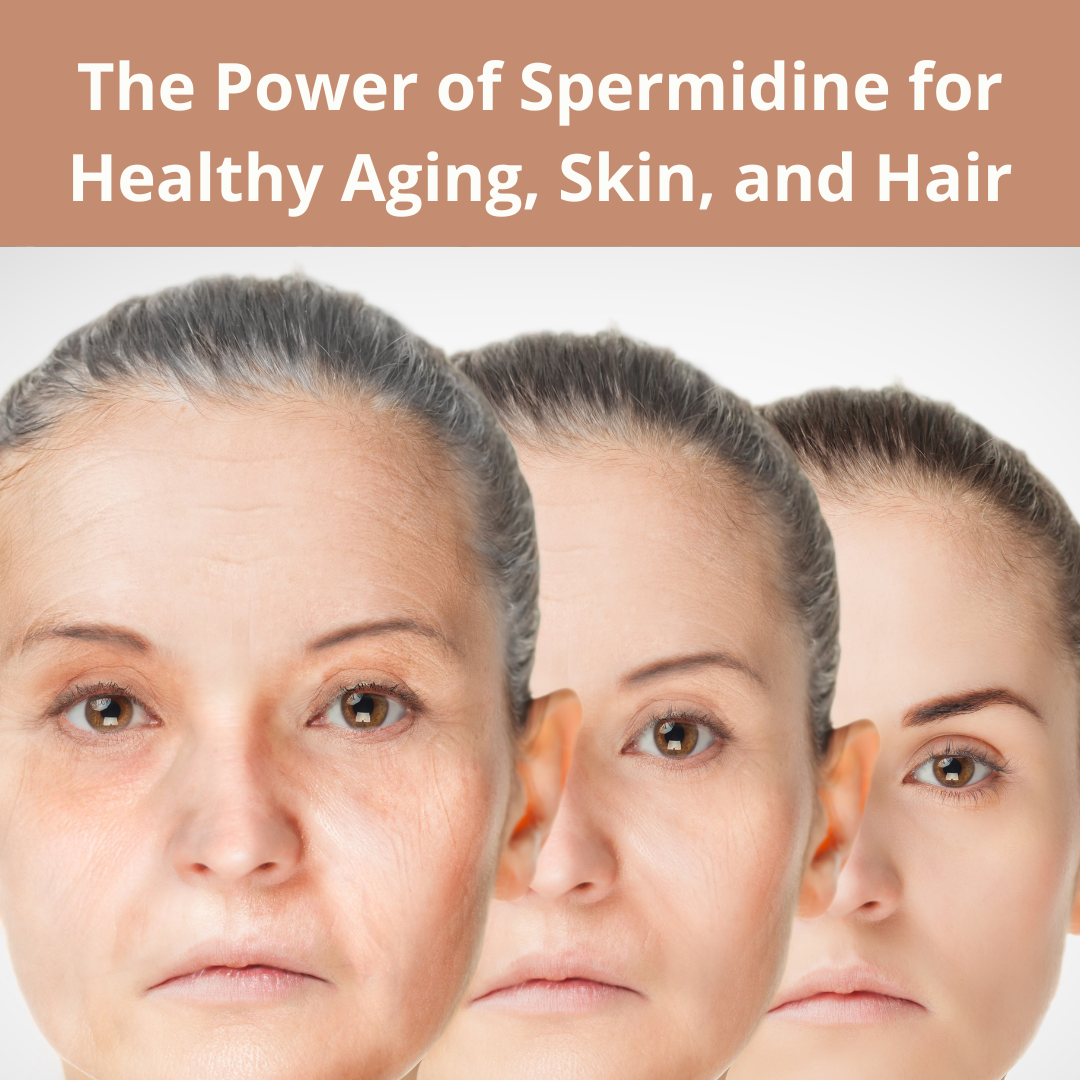
The Power of Spermidine for Healthy Aging, Skin, and Hair!
Share
The Power of Spermidine for Healthy Aging, Skin, and Hair
It's time to discover this unsung hero that might just be the key to supporting healthy aging, maintaining glowing skin, and promoting luscious hair growth. Let’s take a look into the science behind spermidine and its remarkable benefits for overall well-being and longevity.
What is Spermidine, Anyway?
Let's start with the basics. Spermidine is a naturally occurring polyamine, a group of organic compounds found in all living organisms, from plants to animals to humans. But what makes spermidine so special is its multifaceted role in our body's cellular processes. It's like the conductor of a symphony, orchestrating various functions to keep everything in harmony.
The Autophagy Connection
To understand how spermidine supports healthy aging, we need to take a closer look at autophagy. Autophagy is your body's ultimate clean-up crew, responsible for removing damaged cellular components and recycling them. Think of it as spring cleaning for your cells, ensuring they function optimally and stay youthful.
As we age, though, our cellular clean-up crew starts to slack off. This leads to the accumulation of cellular debris, which can contribute to the aging process. Enter spermidine, our trusty autophagy booster.
Spermidine has been shown to rev up autophagy, making it more efficient and thorough. It's like giving your cells a motivational pep talk, reminding them to stay tidy and organized. By promoting autophagy, spermidine can help delay the signs of aging and keep you feeling youthful.
Healthy Skin and Spermidine
Now, let's talk about something we all cherish—our skin! Spermidine doesn't just stop at maintaining internal cellular health; it extends its benefits to your skin as well.
Skin Cell Renewal
One of the most exciting aspects of spermidine's effect on skin is its ability to promote cell renewal. Skin cells have a limited lifespan, and as we age, this turnover process slows down. Spermidine steps in as the ultimate skin cell cheerleader, encouraging new cells to replace the old ones more efficiently. The result? Fresher, more youthful-looking skin.
Collagen Production
Collagen is the secret sauce for smooth, plump, and wrinkle-free skin. Unfortunately, collagen production tends to decline with age. But here's where spermidine swoops in to save the day. Some studies suggest that spermidine can stimulate collagen synthesis, helping to maintain skin's elasticity and reduce the appearance of fine lines and wrinkles.
Protection from UV Damage
Sun damage is one of the leading causes of premature aging. The good news is that spermidine has antioxidant properties that can help protect your skin from harmful UV rays. While it's no substitute for sunscreen, it can provide an extra layer of defense against the sun's aging effects.
Spermidine for Gorgeous Hair
Are you dreaming of thick, luxurious locks that would make Rapunzel envious? Spermidine might just be the answer to your hair growth woes.
Hair Follicle Health
The health of your hair follicles is crucial for hair growth. Spermidine plays a role in maintaining the integrity of these follicles, ensuring they're in the best condition to produce new hair strands. By promoting a healthy hair follicle environment, spermidine can help stimulate hair growth.
Hair Shaft Strength
Spermidine isn't just about growing more hair; it's also about growing stronger hair. By enhancing the structure of the hair shaft, spermidine helps reduce breakage and hair loss. Say goodbye to hair that snaps like a twig and hello to hair that flows like a waterfall!
The Research Behind Spermidine
Now that we've explored how spermidine can support healthy aging, skin, and hair, let's take a peek at some of the research that backs up these claims.
Healthy Aging Studies
Numerous studies have been conducted to investigate the effects of spermidine on aging. Research involving yeast, worms, and mice has shown that spermidine supplementation can extend lifespan. While these findings aren't directly translatable to humans, they do provide a promising foundation for further research into the longevity benefits of spermidine.
Skin Health Research
When it comes to your skin, there's scientific evidence to support spermidine's role. Studies have demonstrated that spermidine can increase the rate of skin cell turnover and enhance collagen production. These findings suggest that spermidine has the potential to improve skin texture, reduce wrinkles, and promote a youthful appearance.
Hair Growth Studies
Spermidine's potential for promoting hair growth has also piqued the interest of researchers. In a study involving human hair follicles, spermidine treatment led to increased hair shaft elongation and improved hair follicle health. While more research is needed, these early results are promising for those seeking luscious locks.
How to Incorporate Spermidine into Your Routine
Excited to introduce spermidine into your life? Here are some ways you can do just that:
Dietary Sources
Spermidine naturally occurs in various foods, so you can boost your intake by incorporating these into your diet:
- Wheat Germ: A rich source of spermidine, sprinkle it on your cereal or add it to smoothies.
- Soybeans: Tofu, tempeh, and other soy products are excellent choices.
- Mushrooms: Cremini, shiitake, and portobello mushrooms are all good options.
- Aged Cheese: Parmesan, Gouda, and cheddar contain decent amounts of spermidine.
Supplements
Spermidine supplements are available if you prefer a more concentrated source.
Spermidine is more than just a mouthful of a word; it's a potential game-changer in the realm of healthy aging, skin care, and hair growth. By boosting autophagy, promoting skin cell renewal, stimulating collagen production, and supporting hair follicle health, spermidine offers a holistic approach to looking and feeling your best as you age.
Studies
https://www.ncbi.nlm.nih.gov/pmc/articles/PMC8612618/
https://www.ncbi.nlm.nih.gov/pmc/articles/PMC5718121/
https://www.nature.com/articles/s43587-022-00322-9
